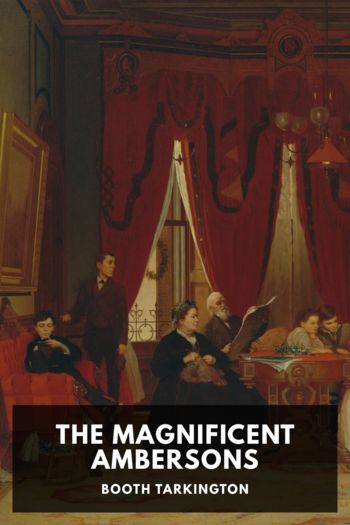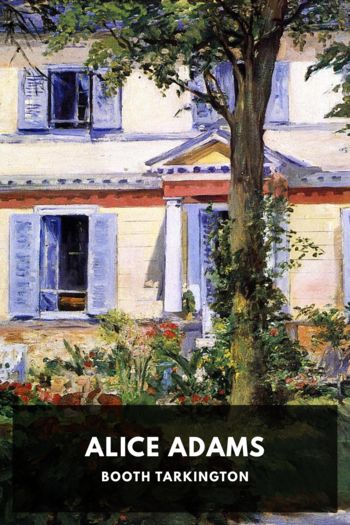National Avenue by Booth Tarkington (book recommendations website .txt) 📕

- Author: Booth Tarkington
Book online «National Avenue by Booth Tarkington (book recommendations website .txt) 📕». Author Booth Tarkington
So far as it concerned Mr. Daniel Oliphant, aged twenty-six, New York was romantic Bagdad enough when the jingling harness began to glitter in the park and on the Avenue in the afternoon, and he would go out from the Holland House to see the pretty women, all beautifully dressed, he thought, and wearing clumps of violets, or orchids, as they reclined in their victorias drawn by high-stepping horses. Dan liked to watch, too, the handsome grooms and coachmen in their liveries, with cockaded silk hats, white breeches, top boots, and blue coats; for they were the best-dressed men in the town, he thought, and he often wished he knew whether they were really as haughty as the horses they drove or only affected to be so proud professionally.
In New York, this Daniel took some thought to his own tailoring and haberdashing; he would even add a camellia to the lapel of his frock coat when he strolled down to lounge in the doorway of the great Fifth Avenue Hotel and stare at the procession of lovely girls from everywhere in the country, their faces rosy in the wind, as they walked up Broadway after an autumn matinée. Then he would join the procession, a friend accoutred like himself being usually with him, and they would accompany the procession sedately in its swing up the Avenue; sometimes leaving it, however, at the magnificent new Waldorf, where the men’s café offered them refreshment among lively companions. In truth, this congenial resort had too great an attraction for the amiable Dan, and so did the room with the big mirror behind the office at the Holland House. Moreover, when he spoke of Daly’s, he did not always mean Mr. Augustin Daly’s theatre, though he preferred it to the other theatres; sometimes he meant a Daly’s where adventure was to be obtained by anyone who cared to bet he could guess when a marble would stop rolling upon a painted disk.
Of course he made excursions into the Bowery, waltzed and two-stepped at the Haymarket after long dinners at clubs, fell asleep in hansom cabs at sunrise, and conducted himself in general about as did any other “rather wild young man,” native or alien, in the metropolis. There were droves of such young men, and, like most of the others, Dan frequently became respectable, and went to a dinner or a dance at the house of a classmate; he was even seen at church in the pew of a Madison Avenue family of known severity. However, no one was puzzled by this act of devotion, for Lena McMillan, the daughter of the severe house, was pretty enough to be the explanation for anything.
Her brother George, lacking the severity of other McMillans, and as unobtrusive as possible in advertising that lack, was one of Dan’s chance acquaintances during a Bagdadian night. At the conclusion of many festivities, the chance acquaintance murmured his address, but Dan comprehended the unwisdom of a sunrise return of so flaccid a young gentleman into a house as formidable as the McMillans’ appeared to be, when the nighthawk hansom stopped before it; and the driver was instructed to go on to the Holland House. Young McMillan woke at noon in Dan’s room there; shuddered to think that but for a Good Samaritan this waking might have taken place at home, and proved himself first grateful, then devoted. It was the beginning of a lifelong friendship; and he took Dan to tea in Madison Avenue that afternoon.
Something withholding about the McMillans reminded their guest of his brother Harlan; and probably Dan would have defined this as “an air of reserve”; but it was more than reserve, deeper than reserve, as in time he discovered. George McMillan alone seemed to have none of it; on the contrary, his air was habitually friendly and apologetic—possibly because of what he knew about himself and what his family didn’t. Mrs. McMillan and her daughters found it unnecessary either to smile or offer their hands when George presented the good-looking young Midlander, nor did they seem to believe themselves committed to any effort to make the stranger feel at home in their long, dark drawing-room.
They gave him a cup of tea and a bit of toast, and that appeared to be the end of their obligation to a stray guest, for they at once continued a conversation begun before his arrival, not addressing themselves to him or even looking at him. Mrs. McMillan’s cousin’s husband, named Oliver, he gathered, was about to be offered a position in the cabinet at Washington, and Mrs. McMillan hoped Oliver wouldn’t accept, because Milly and Anna and Charlotte, persons unknown to Dan, would have to give up so much if they went to live in Washington instead of Boston. If it were an ambassadorship the President wanted Oliver for, that would be better, especially on Charlotte’s account.
The guest began to have an uncomfortable feeling that he must be invisible;—no one seemed to know that he was present, not even the grateful George, who was feeble that afternoon and looked distrustfully at his tea, of which he partook with an air of foreboding. Dan could not help meditating upon what a difference there would have been if the position were reversed, with George as the guest and himself as the host. Dan thought of it: how heartily his mother and father would have shaken hands with the young Easterner, welcoming him, doing every reassuring thing they could to make him feel at home, talking cordial generalities until they could get better acquainted and find what interested him. But although Dan felt awkward and even a little resentful, it was not the first time he had been exposed to this type of hospitality, and he was able to accept it as the custom of the country.





Comments (0)